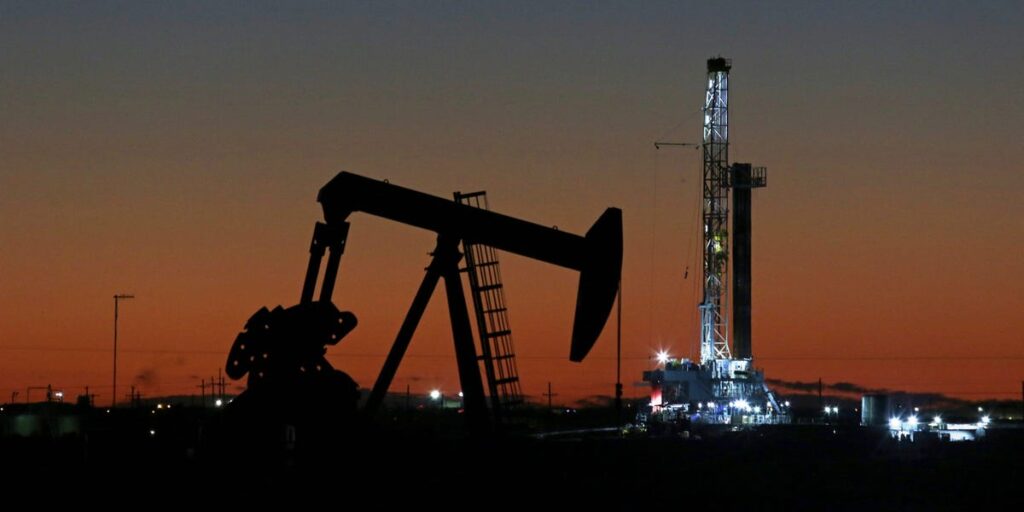Crude oil prices surged on Friday after Israel said it had launched strikes at Iran, prompting fears of energy supply disruptions from the Middle East.
US benchmark West Texas Intermediate crude oil futures jumped as much as 14% late on Thursday. They were trading 9.4% higher at $74.44 a barrel at 12:39 a.m. ET on Friday.
International benchmark Brent crude oil futures gained as much as 13% and were up 9% at $75.60 a barrel.
“This has elevated geopolitical uncertainty significantly and requires the oil market to price in a larger risk premium for any potential supply disruptions,” wrote Warren Patterson, the head of commodities strategy at ING, on Friday.
Iran is the fourth-largest oil producer in the Organization of Petroleum Exporting Countries and has repeatedly threatened to close the Strait of Hormuz, a key oil shipping route for oil and gas that connects the Persian Gulf to the Gulf of Oman.
“This has elevated geopolitical uncertainty significantly and requires the oil market to price in a larger risk premium for any potential supply disruptions,” wrote Warren Patterson, the head of commodities strategy at ING, on Friday.
Nearly a third of global seaborne oil moves through the Strait of Hormuz, wrote Patterson. Qatar, which accounts for one-fifth of the world’s liquified natural gas trade, also uses this route to ship the fuel.
“Unfortunately, there is no alternative route,” wrote Patterson. “This would leave the global LNG market extremely tight, pushing European gas prices significantly higher.”
The sharp upswing in oil prices comes after a period of lull in the oil markets due to ample supply and slow demand. Until now, crude prices were broadly moving lower this year.
Any sustained rise in energy prices would push up inflation and pump prices at a time of heightened economic uncertainty amid President Donald Trump’s import tariffs.
The spike in uncertainty following Israel’s strike on Iran is putting a huge damper on market sentiment that had only been recovering recently after volatility in April following “Liberation Day.” Just a few days ago, the S&P 500 was near its record high.
On Friday, US stock market futures were trading lower at 12:33 a.m. ET.
- S&P 500 futures: down 1.6% at 5,953.00
- Dow futures: down 1.5% at 42,671.00
- Nasdaq futures: down 1.8% at 21,767.25
“This morning’s alarming escalation is a blow to risk sentiment and comes at a crucial time after macro and systematic funds have rebuilt long positions and investor sentiment has rebounded to bullish levels,” wrote Tony Sycamore, a market analyst at IG.
Sentiment is likely to worsen ahead of the weekend as investors cut positions to avoid risk, he added.
“Markets are on high alert, justifiably fearing a rapid escalation in the conflict, that my spiral into an unbridled war,” wrote Vishnu Varathan, Mizuho’s head of macro research for Asia, excluding Japan.
Japan’s Nikkei 225 was 1.3% lower at 1:25 p.m. local time. Hong Kong’s Hang Seng was down 0.7% at midday, while China’s CSI 300 was 0.8% lower.
Israel’s major strike against Iran
Israel’s military launched a major preemptive strike against Iran’s nuclear program on Friday morning local time. Israeli Prime Minister Benjamin Netanyahu said in a video statement on Friday that the operation will continue “for as many days as it takes.”
Netanyahu said in his statement that Iran has produced enough highly enriched uranium for nine atom bombs, but did not provide any evidence to back his claim. Iran’s nuclear program presents “a clear and present danger to Israel’s very survival,” he added.
Israel’s strike on Iran comes as the US is engaging Iran on a new nuclear deal. President Donald Trump said earlier on Thursday that an attack on Iran “could very well happen” if they were not able to reach an agreement.
Secretary of State Marco Rubio said in a statement on Thursday, after the attack, that Israel had taken “unilateral action” against Iran.
“We are not involved in strikes against Iran and our top priority is protecting American forces in the region,” Rubio said.
This is a developing story. Please check back for updates.


